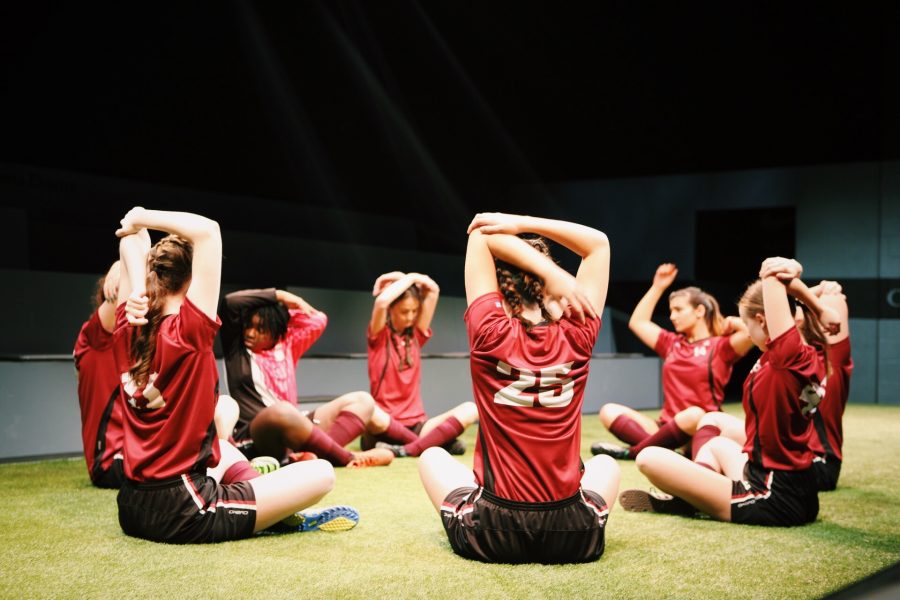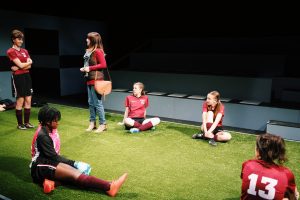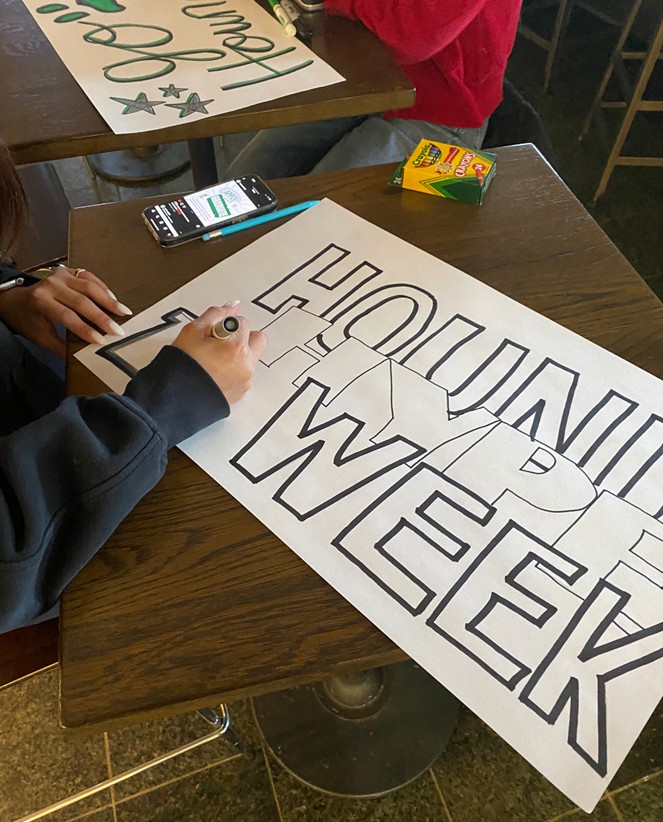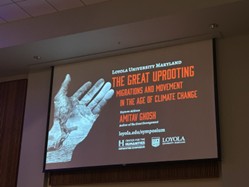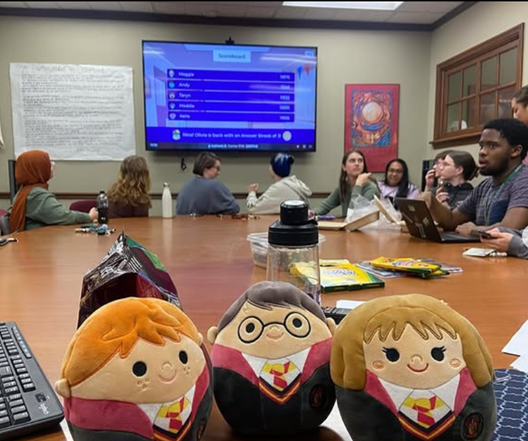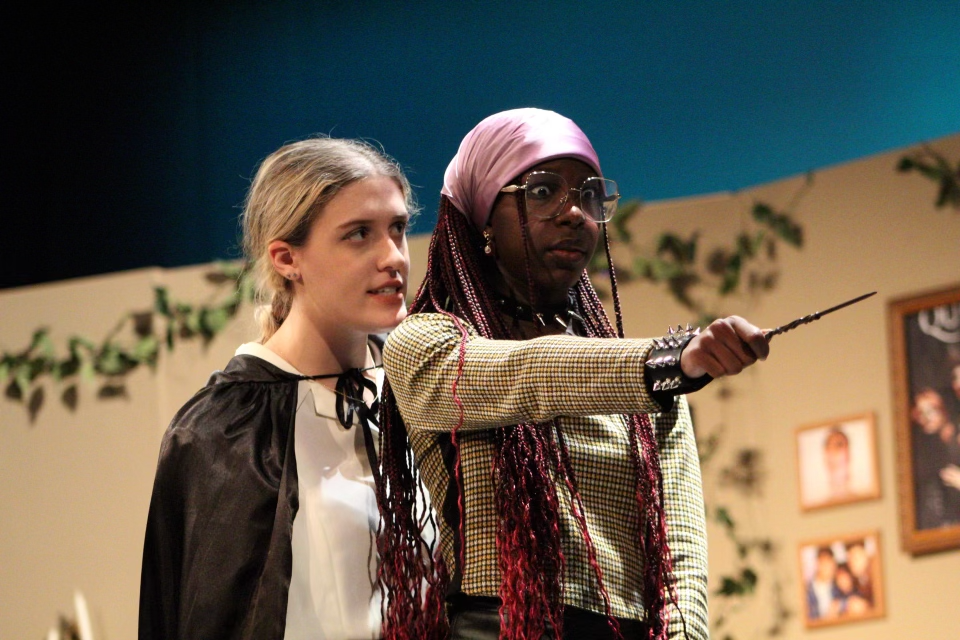This past weekend, from Oct. 25-Oct. 28, the Evergreen Players held their first production of the school year with “The Wolves” by Sarah DeLappe over the course of a four-day, five-show run in McManus Theater. Directed by theater professor and 2019 Class Dean Dr. Natka Bianchini, the Players’ rendition of the show presented a raw, powerful, and heart-wrenching meditation on adolescent camaraderie and growth that gave the audience a new appreciation for female friendship and teamwork.
“The Wolves” follows a team of high school soccer players as they move through their season and deal with life’s challenges. The nine-person team shows a vast intersection of identities and backgrounds, varying in family dynamics, passions, personal traumas, and interests.
Despite their differences, what lies at the heart of this motley crew is their love for soccer. The play takes place exclusively on an indoor field, but the audience never actually sees the girls play a game: instead, they are invited into the more intimate space of soccer practice, where the girls discuss everything from tampons to parent troubles, and sometimes even each other.
Both in real life and in the world of theatre, high school aged girls are consistently written off as immature and unsubstantial, but “The Wolves” works to challenge this notion.
“Teenage girls are rarely heralded as protagonists and one of the things I love about this play is that DeLappe creates nine interesting, complex, passionate, talented young female characters and puts them front and center in this story,” Bianchini said.
In this midst of the seemingly mindless babble that fills the soccer field during stretches and drills, the audience witnesses bursts of passion from the characters that tip them to the girls’ meaningful interiors.
In the opening scene, a heavy debate ensues around sentencing a Khmer Rouge Cambodian “Nazi” to prison for life. During one practice, player #11 bursts into a fierce monologue about the inhumanity surrounding keeping Mexican children in cages. In another, we see a discussion about the use of the “R” word and the lack of morality in the Abu Ghraib prisons.
More than once, the audience is made to realize that these young girls do in fact care about the world, and are hyper-aware of the many injustices taking place around them.
“In the wake of the last year, from the renewed focus on sexual harassment and abuse through the #MeToo movement, to the more recent Kavanaugh hearings, it feels like we are in a cultural moment where we are thinking, collectively, about how much we listen and pay attention to women’s voices,” Bianchini said. 
The teammates also had their fair share of light hearted banter, jokes taken too far, and hostile confrontations. DeLappe expertly portrays the difficulties of navigating through life when you don’t quite know yourself yet, and how this influences your relationships and world views.
The age and maturity difference between the college actresses and the high school-aged characters they played put their acting ability to the test, demanding an added layer of expertise to give their characters justice.
“The most challenging part of playing player #14 was coming to terms with her attitude and insecurities. Her character was mostly defined by being the best friend of player #7, [who had] a more superior and dominant personality,” Serina Addona ’20 said.
“Being someone who has always had a bold personality myself, it was interesting and sometimes difficult to play a character who had a hard time speaking her mind and being honest about her feelings, simply because that’s not what I’m like, as Serina.”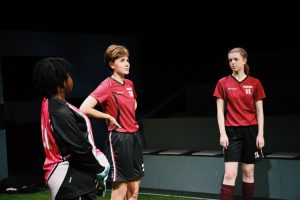
Other actresses saw glimpses of their past selves in their characters, making it a bit easier to play the part.
“I’ve definitely been the awkward new girl at many points in my life like my character #46, and I think a lot of the girls on the team struggle with trying to be accepted by the group, which is something I think everyone experiences from time to time,” said Kayla Greene ’22.
The evenness of the girls’ lives comes to a crashing halt with the sudden death of one of their teammates, #14 (played by Addona). In the aftermath of her death, the girls come to realize the bond that has formed between them over countless soccer seasons not only as teammates, but as friends.
Prior to the start of a game played in honor of #14, the girls let their guards down and allow themselves to be completely vulnerable with one another, discussing their experiences of loss, grief, and rage, and how this has affected processing #14’s death.
Adding to the intimacy of their dialogue is the actual construction of the set, which seated the audience in bleachers on either side of the soccer field. This allowed for a 360 degree environment that highlighted the subtleties in the girls’ interactions, adding to their authenticity.
“Working on a show that was in the round was a fairly new experience for me so it was really interesting to learn about changing up blocking so that both sides of the audience get a similar experience,” Greene said.
Bianchini explained that the choice to build this kind of set has actually been a long-term dream for her as a play director at Loyola.
“It was simply a matter of finding the right production to do it. [I wanted] the audience [to] feel like they were inside the same space as the actors, not separate from it,” Bianchini said.
The cast also faced significant challenges in memorizing their lines because of how DeLappe wrote the script. To fully capture the organic nature of the girls’ simultaneous conversations, DeLappe wrote overlapping dialogue that often requires them to talk over each other.
“Aside from memorizing the right words to say, we also had to memorize exactly when to say them,” Addona said. “In order to learn the lines, we voice recorded all of us reading through the script and were able to listen to it in between rehearsals to create consistency in how the conversations overlapped.”
But the cast proved that even the most complicated of productions can be accomplished through teamwork.
“The impact of the show goes far beyond the performance of any one certain individual. You can’t just have people playing defense, you need offense, too,” Addona said. “Especially in an ensemble play like ‘The Wolves’ where everyone has just as important of a role as the next, team building is especially important to create a successful show.”
The dedication that the cast put into the production surely paid off, creating bonds with each other along the way that go well beyond the field and the stage.
“One of the main reasons I auditioned right away was because of the group of people. In my experience, I have always found close friends and kind people through performing,” Greene said. 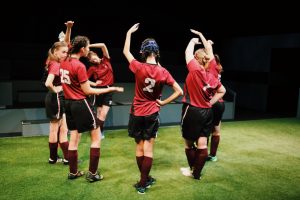
“Being new to this campus and not knowing many people, I was looking forward to finding a supportive group of new friends. This cast and crew was so amazing to work with, I’ve been telling my friends and family that this is my favorite show I have worked on because the people I worked with were all so wonderful.”
The Evergreen Players’ powerful rendition of “The Wolves” not only honors the strength and complexities of young women and empowers them to challenge labels and raise their voices, but also gets at the heart of what it means to build connection with, grow alongside, and support others.
Next month, the Poison Cup Players will put on a production of “Getting Out” by Marsha Norman under the direction of Hannah Machon ’18.
All Photos Courtesy of Britanni Borden ’19 of Borden Media







































































































